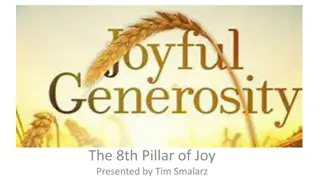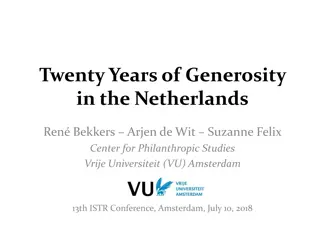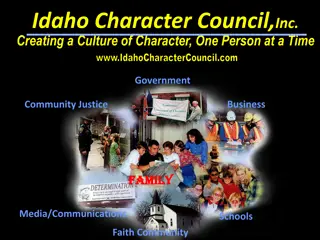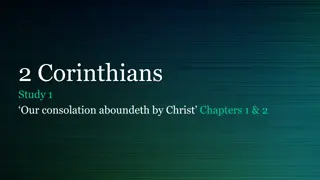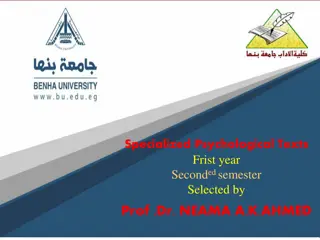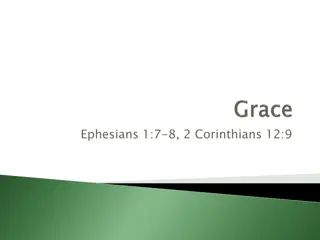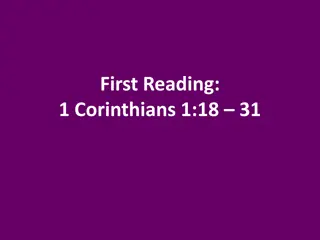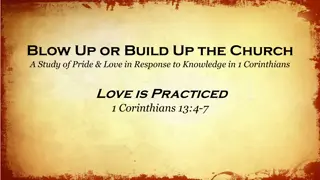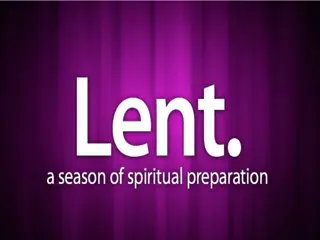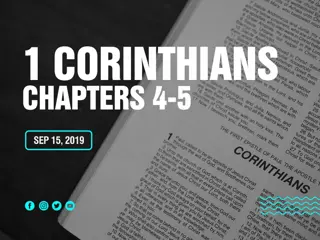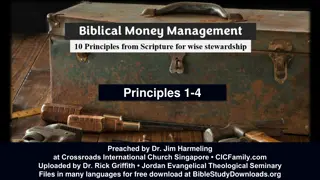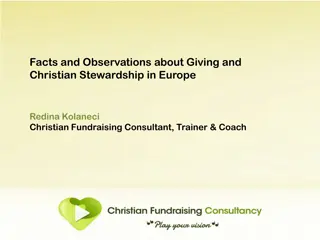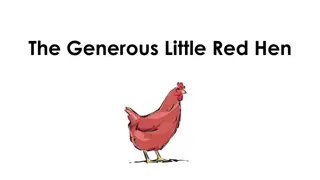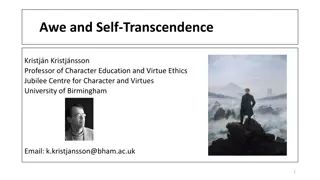Understanding Generosity in 2 Corinthians
Exploring the themes of charity and generosity in 2 Corinthians, this study delves into the importance of responding to God's grace with a spirit of giving. Paul encourages believers to emulate God's abundant blessings by generously supporting others, emphasizing the spiritual benefits of a community united in acts of kindness and love.
Uploaded on Sep 20, 2024 | 0 Views
Download Presentation

Please find below an Image/Link to download the presentation.
The content on the website is provided AS IS for your information and personal use only. It may not be sold, licensed, or shared on other websites without obtaining consent from the author. Download presentation by click this link. If you encounter any issues during the download, it is possible that the publisher has removed the file from their server.
E N D
Presentation Transcript
The Self The Self- -Sacrificial Ministry Sacrificial Ministry Ministry Through Giving Ministry Through Giving Week 92 12 June 2024
2 CORINTHIANS INTRODUCTION In our continuing study of Second Corinthians, the themes of this letter revolves around both the theological concepts and the practical aspects of Christian living. The primary issue at Corinth was the recognition of authentic ministry and submission to apostolic authority. Paul s corrective was to provide guidance and encouragement as the church navigates the challenges that continue to influence their unity, discipline, and spiritual growth. In our study, Paul addresses the issue of charity and generosity among believers, he encourages the Corinthians to be generous, assures them of God s provision, and highlights the spiritual benefits of their generosity, both for the recipients of their charity and for themselves as a community of believers.
2 CORINTHIANS - LESSON OVERVIEW Swindoll. . . opens by reminding us of the parable Jesus told in Luke 7:36-47, about the woman who washed his feet with her tears, wiped them with her hair, and kissed and anointed them with the fragment oil from an alabaster box. This parable was meant to frame a simple situation: Two people owe the same creditor, but one owes a significant amount of money and the other only a small amount. If the creditor forgives both debts, which person will be more thankful? The point Jesus makes is that a great amount of forgiveness the grace Jesus had shown to this woman results in a great outpouring of love the woman s response to Jesus.
2 CORINTHIANS - LESSON OVERVIEW The point is, that the joy being forgiven is one that results in a life full of grace toward others. This principle of acting in response to God s grace with an outpouring of love is one that guides Christian conduct in every area of life. A mindful response to what the Lord has done for us results in a gracious and willing attitude to help those around us, especially fellow believers. So, it should not surprise us then that this principle of God s overflowing grace underlies Paul s thinking when he speaks to the Corinthians about their giving. In these verses, Paul deals with the application of giving by describing the manner in which we are to give. Saying, in effect, that we need to put into action the principles characterized by others examples and in response to God s abundant blessings.
2 CORINTHIANS - LESSON OVERVIEW In other words, the one who claims to live obediently by faith in God does not ignore this essential area of ministry. So, as a response to what God has done for us we are encouraged to pass on God s grace to others in tangible ways, as we bountifully and cheerfully give back to God.
2 CORINTHIANS 9:7 7 So let each one give as he purposes in his heart, not grudgingly or of necessity; for God loves a cheerful giver.
2 CORINTHIANS 9:7 In verse 6, Paul draws upon an agricultural metaphor to illustrate the spiritual truth that sparingly sowing leads to a scanty harvest. Generous sowing, however, leads to an abundant harvest. He takes this general principle and makes it personal, to every individual (9:7). Here Paul addresses each one. There are no exceptions. Everybody must be involved in financial stewardship and contributing to the ministry in some way. This giving must also be intentional, not haphazard. The Greek term for purposed means to choose beforehand or decide ahead of time. So the believers financial planning should originate not from external pressures but from the heart.
2 CORINTHIANS 9:7 Gracious giving results from heartfelt resolve. If it does not spring from the heart, it is given grudgingly or under compulsion. But when giving comes from a heart full of cheer, it will not only feel rewarding for the giver, but it will also inspire others with the joy of giving. Look at what Paul says at the end of the verse, for God loves a cheerful giver. The Greek word for cheerful is hilaros our word for hilarious which means funny. However, this doesn t mean that God loves a ridiculous giver, or a funny giver, or a giver who doesn t take giving seriously.
2 CORINTHIANS 9:7 It means that God desires our giving to generate the same exuberant joy in our hearts as a lively celebration or a healthy laugh. If you can t give with a smile, then you are not giving from the heart. Swindoll says . . . When I look at how giving has been treated in the church today, I feel most of us have been ripped off! So many churches have taken the joy out of giving. They have prescribed certain percentages or pushed hard for certain amounts. That it sounds more like the drudgery of the Law than the joy of grace. According to Paul, giving should be fun! But it s not fun to be handed a bill and asked to write a check. Hard sells aren t fun. Neither is it fun giving to meet some arbitrary goal.
2 CORINTHIANS 9:7 However, giving in response to God s grace, giving to others out of love and joy, and giving to a ministry vision we believe in is fun . . . that s cheerful giving. That s grace giving. . . generously without prescription, voluntarily without compulsion.
2 CORINTHIANS 9:8-11 8And God is able to make all grace abound toward you, that you, always having all sufficiency in all things, may have an abundance for every good work. 9As it is written: He has dispersed abroad, He has given to the poor; His righteousness endures forever. 10Now may He who supplies seed to the sower, and bread for food, supply and multiply the seed you have sown and increase the fruits of your righteousness, 11while you are enriched in everything for all liberality, which causes thanksgiving through us to God.
2 CORINTHIANS 9:8-11 Paul now moves the focus from the immediate giver to the ultimate giver. We can give liberally, without worry, because God will make His grace abound to us so we will always have enough (9:8). Remember: We can never out give God. God will never appear one day and say, Well, you ve tapped Me dry. There s no more left. As often as we dispense our resources in generous giving, God will replenish them and refresh us with divine grace. His principle of liberal provision will always create confidence in us as givers. Paul, in verses 9-10, quotes the Psalms and alludes to the prophet Isaiah to support this argument about giving.
2 CORINTHIANS 9:8-11 Keener explains Paul s argument this way . . . In verse 9, Paul quotes Psalm 112:9, which in context refers to the generosity and vindication of the righteous; having given to the poor their righteousness endures. Yet God is the supreme benefactor on whom these generous benefactors also must depend; and in verse 10, Paul recalls Isaiah 55:10, which speaks of God as the one who gives seed to the sower and bread for food. As they keep giving, God would keep multiplying their seed so they could give more and multiply their harvest of righteousness. The storehouse of all good thing belongs to God (James 1:17). From His infinite source of blessing, God can replenish all the seed we sow, whether it is material or spiritual.
2 CORINTHIANS 9:8-11 God not only supplies the seed, He also multiplies it (9:10). people is to produce thanksgiving to Himself (9:11). Everything returns to God s glory, that He would be praised and thanked for His bountiful blessings. The ultimate purpose of God s liberal provision to His we received a surprising blessing from God. Swindoll . . . Encourages us to think about the last time the Lord. You waited on God patiently surrendered to His provision and His timing. Your need was great, but nobody knew except you and source. Then God miraculously provides through a surprising
2 CORINTHIANS 9:8-11 You never expected it, yet there it is. Remember your response? Thanksgiving. Oh how I thank You, Lord! That s the kind of praise the Lord always deserves from us in response to His ministry of grace. The people in Jerusalem were desperate. Cut off from the rest of the world, they had no ability of themselves and no hope of relief from others. So, they turned their attention to God and God alone, the One who could do miracles. Then one day, a delegation arrived a small group sent by Paul, representing churches and hundreds of Gentile Christians unknown to the Jewish believers in Jerusalem.
2 CORINTHIANS 9:8-11 They laid before the elders of the Jerusalem church a large amount of money, enough to purchase food, and to supply relief for months to come. What a demonstrationof God s amazing provision! It was a testimony to the scoffing Pharisees of the wonder working love, among those who comprise the Christian church. That such a gift would come from the very people they considered to be unclean Gentiles.
2 CORINTHIANS 9:12-15 12For the administration of this service not only supplies the needs of the saints, but also is abounding through many thanksgivings to God, 13while, through the proof of this ministry, they glorify God for the obedience of your confession to the gospel of Christ, and for your liberal sharing with them and all men,14and by their prayer for you, who long for you because of the exceeding grace of God in you. 15Thanks be to God for His indescribable gift!
2 CORINTHIANS 9:12-15 This bountiful gift would bring a joyful response from the recipients. So, Paul encourages the Corinthian church to give by helping them see that giving evokes a reciprocal blessing. Those who give joyously and graciously, seeking no credit for themselves, glorify God (9:13). The result? The entire process floods heaven with a high tide of praise, surging at the feet of the Lord (9:12). Notice that everybody involved is blessed. FIRST the giver is blessed by the joy inherent in giving and by the promise of reward from the hand of God. Jesus, Himself said, It is more blessed to give than to receive (Acts 20:35).
2 CORINTHIANS 9:12-15 One reason is because those who give received the benefit of the prayers of the recipients on their behalf (9:14). SECOND the recipients of the gift are also blessed. They received a solution to their problems and relief for their affliction. THIRD God is also blessed, as the recipients overflow through many thanksgivings to God (9:12). They glorify God because of the givers obedience and attribute to God ultimate responsibility for the blessing (9:13). Paul closes with a sudden outburst of gratitude to God for His grace: Thanks be to God for His indescribable gift!
2 CORINTHIANS 9:12-15 The perfect picture of God s grace is Jesus Christ hanging on an ole rugged cross. It puts the Ministry Through Giving into perspective. Can you turn away from this picture of love, of giving, and a picture of amazing self-sacrificial grace? Can you look at the cross and not be changed, not be compelled to give yourself to Him, not be compelled to give to others in the way God has given to you?
APPLICATIONS OF THE LESSON New Covenant Giving
APPLICATION NEW COVENANT GIVING In closing Swindoll . . . reminds us that stewardship is a key principle in scripture stewardship of our time, our gifts, our abilities, and our money. The Old Testament prescribed very specific regulations for giving tithesandofferings (Lev. 27:1-34; Deut. 14:22-28; Mal. 3:8-10). In the New Testament, Jesus frequently spoke about wealth, riches, money, and stewardship (Matt. 6:24; 13:22; Mark 4:19; Luke 15:12; 16:1-13). The New Testament is the fulfillment of the Law, and the tithe or the mandatory 10 percent predates the Law and celebrates the faith of Abraham in giving to God. So, the New Testament addresses the issue of generous financial contributions and the stewardship of one s possessions.
APPLICATION NEW COVENANT GIVING Based on God s blessings to us. There are four passage in the New Testament, all in Paul s letters to the Corinthians, that we should consider as we plan our giving. Each of these passages focus on a different element of giving. 1) 1 Corinthians 9 Justification for Giving 2) 1 Corinthians 16 Instructions for Giving 3) 2 Corinthians 8 Illustrations of Giving 4) 2 Corinthians 9 Application of Giving 1) 1 Corinthians 9:11-18 Justification for Giving! Those ministers who sow spiritual things through their preaching and teaching have a right to receive material support from those to whom they minister (1Cor. 9:11). Fair remuneration is explicitly prescribed and encourage in Scripture (1Tim. 5:17-18).
APPLICATION NEW COVENANT GIVING Though Paul chose not to receive money for his spiritual labor, it was his own decision, not a required principle for others (1Cor. 9:12, 15-18; Acts 20:33-35). 2) 1 Corinthians 16:1-2 Instructions for Giving! For all who wonder about proper procedures, these verses supply us with a good check list to guide our giving. Notices here there is no pressure, no announcement, no public attention, and no manipulation. Giving should be: Systematically on the first day of every week. Individually each one of you. Consistently put aside and save. Proportionately as he may prosper. Privately no collections be made when I come.
APPLICATION NEW COVENANT GIVING 3) 2 Corinthians 8:1-9 Illustrations of Giving! Paul give us two illustrations of proper giving: the Macedonians (8:1- 3) and Jesus Christ (8:9). In these verses we see that giving should be done with great generosity (8:1-3) as an overflow of our devotion to the Lord (8:5). Just as Jesus Christ gave up everything for our sakes becoming poor so that we might become spiritually rich (8:9) we, too, should give self-sacrificially (8:3). 4) 2 Corinthians 9 Application of Giving! Like the rest of the Christian life, giving is not to be done out of oppressive obedience to rules and regulations, in response to guilt trips or because of peer pressure.
APPLICATION NEW COVENANT GIVING Giving should be from the heart. Ideally, giving should be done with a free and willing attitude. A person should not be reluctant to give, nor regret giving but rather be eager to give, and to receive the joy that abounds from their stewardship through giving. Lord help us to strengthen the body of Christ, and bring glory to You by understanding and practicing the principles taught in these passages.
NEXT CLASS 19 June 2024 Before next class, read the below chapters in Before next class, read the below chapters in the KJV and in one other versions of the Bible, the KJV and in one other versions of the Bible, i.e., NIV, NRSV, TLB, CEV, etc i.e., NIV, NRSV, TLB, CEV, etc Chapter 10:1 18 In Defense of Paul s Ministry




